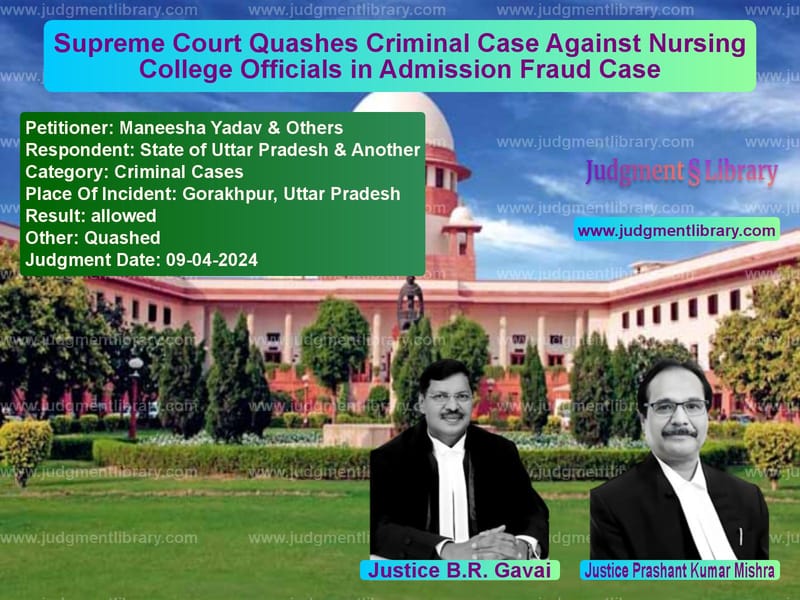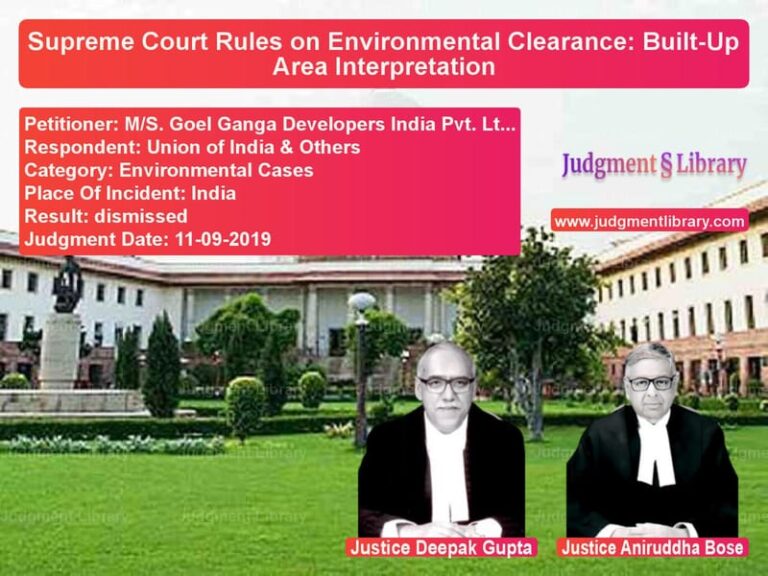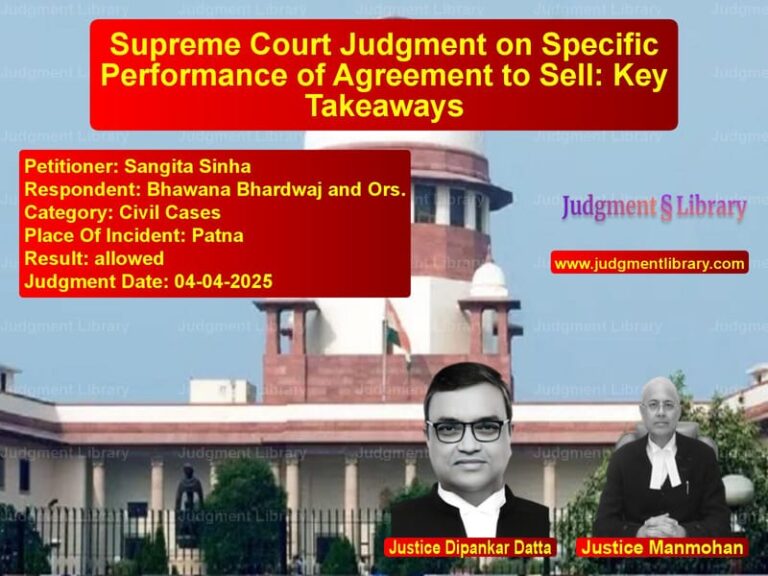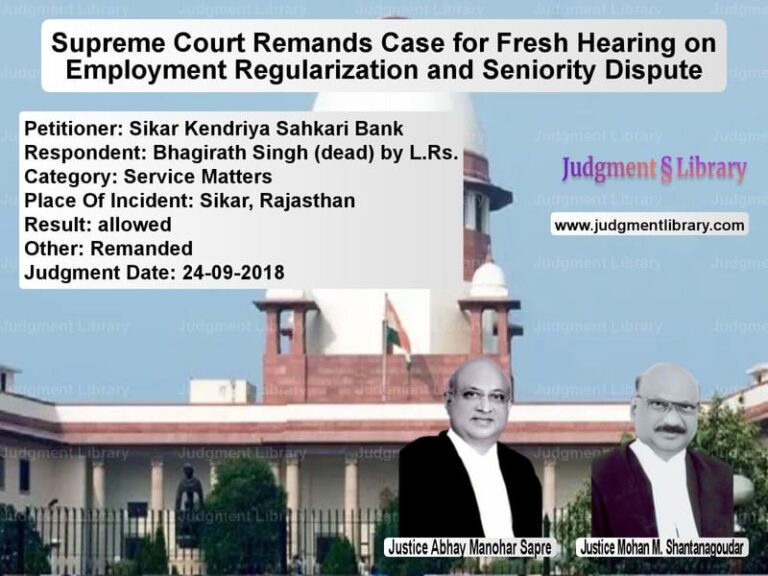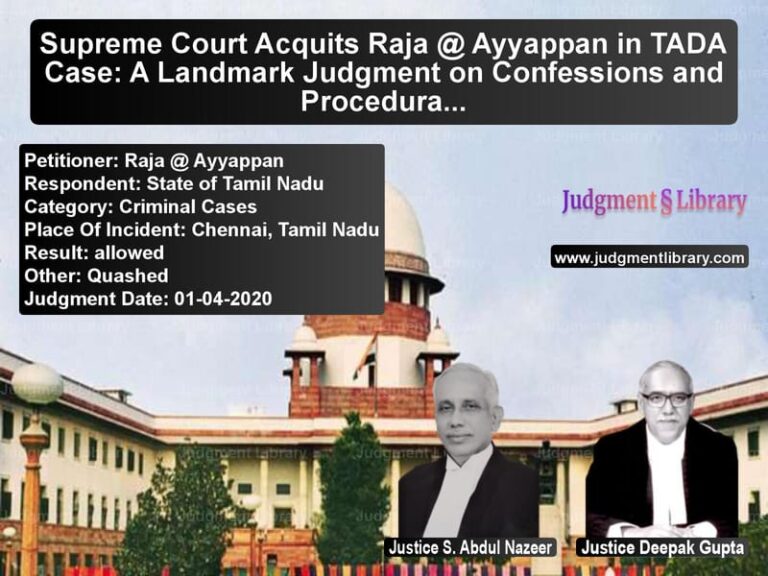Supreme Court Quashes Criminal Case Against Nursing College Officials in Admission Fraud Case
The case of Maneesha Yadav & Others vs. State of Uttar Pradesh & Another revolves around allegations of fraud in nursing college admissions. The Supreme Court was tasked with determining whether the appellants, who were relatives of the college’s management, could be prosecuted despite no direct evidence linking them to the alleged crime.
The Supreme Court ruled that mere familial ties to the accused do not constitute sufficient grounds for prosecution. It quashed the FIR and charge sheet against the appellants, citing a lack of prima facie evidence against them. This judgment reinforces the principle that criminal liability must be based on material evidence rather than presumptions.
Background of the Case
The controversy began when students at Raj School of Nursing and Paramedical College, Gorakhpur discovered that their admissions were made against unapproved seats. The college had advertised 60 seats, but the official approval was only for 40. As a result, the results of 20 students were withheld, leading them to file complaints.
One such complaint led to the registration of FIR No. 18 of 2015 at Kotwali Police Station, Gorakhpur, against the college’s management. The FIR alleged that the college management had fraudulently induced students to pay for admissions against unapproved seats. The primary accused in the FIR were:
- Dr. Rajaram Yadav (Manager)
- Dr. Abhishek Yadav (Director)
- Dr. C. Prasad (Principal)
The police also named three appellants—Maneesha Yadav, Dr. Poonam Yadav, and Shobhita Nandan Yadav—who were relatives or employees of the accused.
Key Legal Issues
- Whether the allegations in the FIR sufficiently established the appellants’ involvement in the fraud.
- Whether being related to the accused was enough to justify criminal prosecution.
- Whether the High Court erred in dismissing the appellants’ petition for quashing the FIR.
Arguments by the Appellants
The appellants sought relief under Section 482 of the Cr.P.C. to quash the FIR, arguing:
“We were not involved in the college’s management or the admission process. Our names were included in the FIR solely because of our familial ties with the primary accused.”
Their counsel further submitted that the High Court had erred in rejecting their plea by suggesting they apply for discharge instead of evaluating the merits of the allegations.
Arguments by the Respondents
The State of Uttar Pradesh opposed the plea, arguing:
“The appellants were related to the college’s management. Their connections indicate possible involvement in the fraudulent admissions.”
The State contended that the charge sheet had already been filed and that the appellants should seek discharge from the trial court rather than seek quashing of the case.
Supreme Court’s Analysis
1. Lack of Specific Allegations
The Supreme Court examined the FIR and found that it did not contain any specific accusations against the appellants. The Court observed:
“Merely being related to an accused person does not justify their prosecution in the absence of substantive evidence.”
The Court emphasized that criminal proceedings must be based on tangible evidence rather than assumptions.
2. Failure to Establish Prima Facie Case
The Court held that the prosecution had failed to establish a prima facie case against the appellants. It stated:
“There is not a single line in the FIR or charge sheet that attributes a specific role to the appellants in the alleged fraud.”
The Court also noted that there was no evidence to suggest that the appellants induced students to take admission against unapproved seats.
3. Precedents on Quashing of Criminal Proceedings
The Court cited previous rulings, including:
- State of Haryana vs. Bhajan Lal (1992) – Criminal proceedings can be quashed if the allegations do not establish a prima facie case.
- Anand Kumar Mohatta vs. State (NCT of Delhi) (2019) – Merely filing a charge sheet does not prevent the High Court from quashing proceedings if no case is made out.
- Postmaster General vs. Living Media India Ltd. (2012) – Government bodies do not have a separate limitation period and must act diligently.
Based on these precedents, the Court reaffirmed that the burden of proof rests on the prosecution to establish the accused’s involvement.
Final Judgment
The Supreme Court quashed the FIR and charge sheet against the appellants, ruling:
“Continuation of criminal proceedings against the appellants would result in undue harassment when there is no material against them.”
The Court further held that merely being related to an accused person does not justify criminal liability.
Key Takeaways from the Judgment
- Criminal prosecution must be based on clear evidence, not mere suspicion.
- Mere familial ties to an accused person do not justify prosecution.
- High Courts have the power to quash criminal cases if no prima facie case is established.
- Charge sheets do not automatically prevent the quashing of cases where allegations are unsubstantiated.
Judgment Date: April 9, 2024
Judges: B.R. Gavai, Prashant Kumar Mishra
Petitioner Name: Maneesha Yadav & Others.Respondent Name: State of Uttar Pradesh & Another.Judgment By: Justice B.R. Gavai, Justice Prashant Kumar Mishra.Place Of Incident: Gorakhpur, Uttar Pradesh.Judgment Date: 09-04-2024.
Don’t miss out on the full details! Download the complete judgment in PDF format below and gain valuable insights instantly!
Download Judgment: maneesha-yadav-&-oth-vs-state-of-uttar-prade-supreme-court-of-india-judgment-dated-09-04-2024.pdf
Directly Download Judgment: Directly download this Judgment
See all petitions in Fraud and Forgery
See all petitions in Bail and Anticipatory Bail
See all petitions in Judgment by B R Gavai
See all petitions in Judgment by Prashant Kumar Mishra
See all petitions in allowed
See all petitions in Quashed
See all petitions in supreme court of India judgments April 2024
See all petitions in 2024 judgments
See all posts in Criminal Cases Category
See all allowed petitions in Criminal Cases Category
See all Dismissed petitions in Criminal Cases Category
See all partially allowed petitions in Criminal Cases Category

